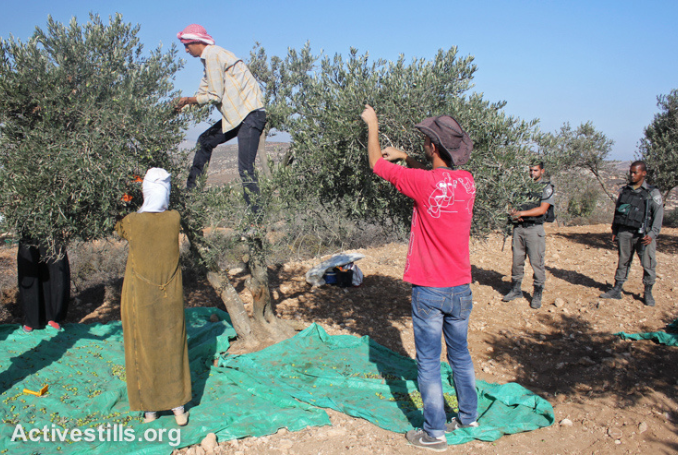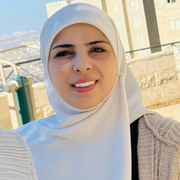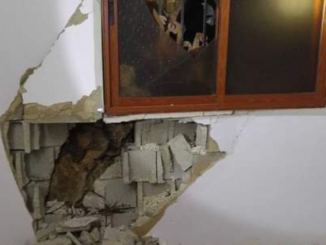
It was a happy moment when Ayed Mazloom was told that he had two whole days to enter his land in the village of Al-Janyeh, near Ramallah, in the occupied West Bank.
Mazloom prepared himself to ‘visit’ his own land located near the settlement of Telmon, which devoured most of the lands of Al-Janyeh village. After hours of waiting for an Israeli permission to enter, he was finally granted access.
“I wasn’t allowed to go there for more than a year, we couldn’t pick olives or plow the land, but we discovered that settlers were stealing the olive harvest from us”, Mazloom said.
After half an hour, a number of Israeli soldiers came and told him that he had to leave the land immediately, under the pretext that the time of his visit was over.
“I was shocked, I didn’t even have time to check the trees or take care of them,” he told The Palestine Chronicle.
“When the soldiers asked me to leave, they told me not to come back the next day because my visiting permit had expired”.
Mazloom’s family lost more than 500 acres after Israel confiscated and seized them due to their proximity to Jewish settlements, not to mention the land that was stolen to build these settlements.
The Israeli forces have confiscated hundreds of thousands of acres in the West Bank since 1967, in order to facilitate the construction of Israeli settlements and military sites.
“Those trees were planted by our ancestors. Since our childhood, we have been raised to take care of them, every day,” Mazloom said. “The land for us is as precious as our children, but the occupation prevents us from entering it and deprives us of this basic right.”
Hard Facts
In 1993, the Oslo agreement, which was signed between Israel and the Palestinian Liberation Organization (PLO), stipulated the division of the West Bank into three categories: the so-called Area ‘A’, under Palestinian control, Area ‘B’ under both Palestinian and Israeli control, and ‘C’, under exclusive Israeli control. The last category alone covers an area of approximately 60% of the total size of the West Bank, according to the Land Research Center.
Jamal Alamleh, the Director of the center, told The Palestine Chronicle that Israel does not only ban the Palestinians from using their own land but also demolishes any building constructed on this land, even if it is as simple as a tent. Palestinians are also prevented from digging water wells in their own land.
“Settlers were given free rein to carry out many assaults against Palestinians in Area ‘C’. The settlers are always fully protected by Israeli soldiers,” Alamleh said.
If any Palestinian files a complaint against the settlers, no one will hear him, but rather he will be treated as an aggressor on the ‘lands of the (Israeli) state’, according to Alamleh.
In 2020, an Israeli minister called for the re-registration of Palestinian lands located within Area ‘C’ under the names of settlers, to make it consistent with Israeli law. In practice, this means the de facto annexation of Palestinian areas, which is illegal under international law.
“If these calls are implemented, the Palestinians will become like intruders in their own land and, according to Israeli law, will be forced to leave (Area C) and relocate to Areas A and B, which are less than 40% of the total West Bank area.”
It Was a Treasure, Now It is Just a Dream
Four years ago, 60-year-old Abd al-Kareem Yousef was heading to his land when he was brutally beaten up by the guards of the Ariel settlement, in the northern occupied West Bank. He suffered numerous cuts and bruises.
“I was going to plant some trees but the guards of the nearby settlement stopped me and checked my ID card. They ordered me to go back but I refused, and when I told them that this is my land and I have the right to enter it, they started beating me up,” Yousef told The Palestine Chronicle.
Until now, Yousef cannot enter his own land in the village of Kfil Hares, near the city of Salfit.
The Ariel settlement block is continuously expanding at the expense of Palestinian lands.
‘I Feel He is Cold’: Israel’s Inhumane Practice of Withholding Palestinian Bodies
Mazloom’s family lost more than 500 acres after Israel confiscated and seized them due to their proximity to Jewish settlements, not to mention the land that was stolen to build these settlements.
“I remember working in it with my father when I was a kid and now I’m forbidden from entering it.”
By confiscating his land, the farmer has lost a major part of the livelihood of his family of nine. Once, it was his treasure. Now it is a distant dream; sometimes a nightmare.
Year after year, privately-owned Palestinian land continues to shrink, almost always due to the constant expansion of illegal Jewish settlements, itself a blatant violation of international law. But nothing has been done to end Palestinian suffering or to bring the prolonged nightmare of Mazloom, Yousef and many others to an end.

– Fayha’ Shalash is a Ramallah-based Palestinian journalist. She graduated from Birzeit University in 2008 and she has been working as a reporter and broadcaster ever since. Her articles appeared in several online publications. She contributed this article to The Palestine Chronicle.







